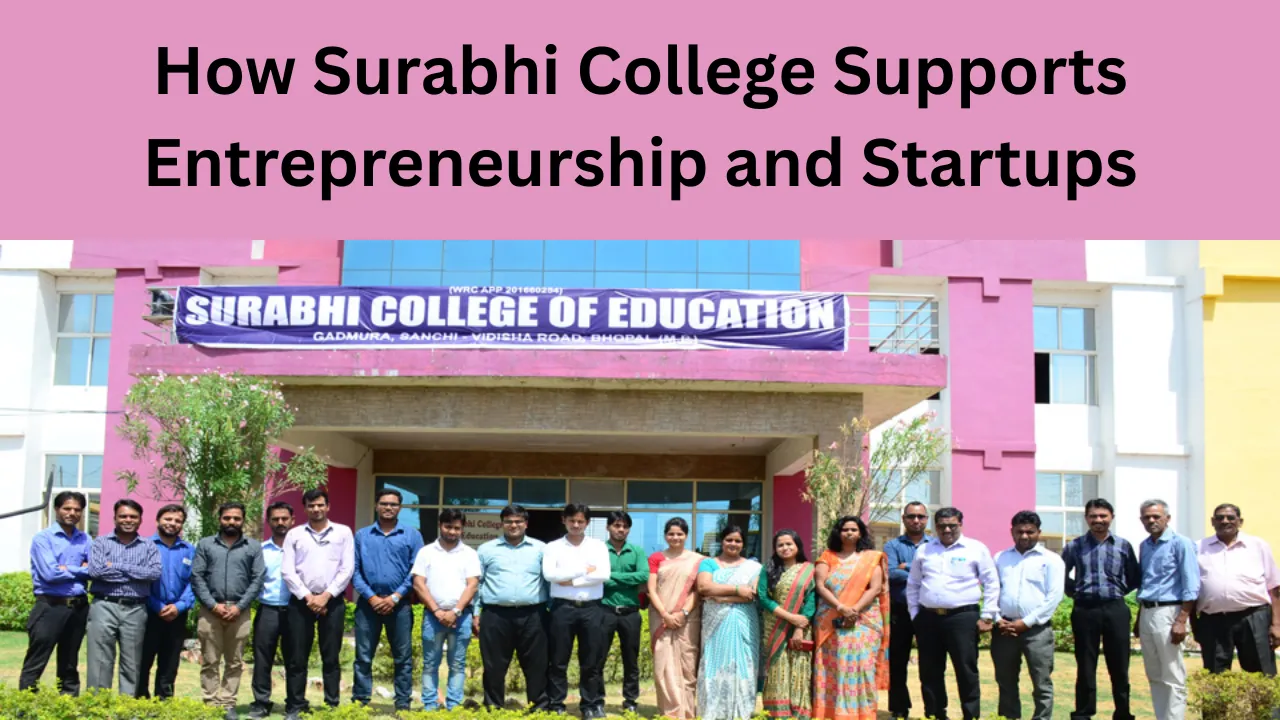How Surabhi College Supports Entrepreneurship and Startups: At Surabhi College of Engineering & Technology, innovation is more than a buzzword. The campus pulses with entrepreneurial energy—students sketching business models in cafeterias, building prototypes in labs, and pitching ideas to mentors. From day one, Surabhi encourages creativity, critical thinking, and startup ambition.
This article explores how Surabhi nurtures student founders. You’ll learn how the college’s incubator, innovation lab, mentor network, funding events, and community culture converge to turn ideas into ventures. Whether you’re a budding entrepreneur or just curious, read on to discover Surabhi’s startup ecosystem in full swing.
Surabhi College of Engineering & Technology: The Launchpad for Student Startups
At Surabhi College of Engineering & Technology, entrepreneurship is woven into the fabric of campus life. The college provides a clear path from ideation to execution through its Innovation Lab, Startup Incubator, and Accelerator Program. With regular hackathons, seed funding, alumni mentors, and business workshops, students gain real-world skills—like pitching, prototyping, market research, and lean startup practices. This supportive environment builds confidence and practical know-how. Surabhi empowers engineering students not just to dream—but to act, build, test, and launch startups that solve real problems.
Entrepreneurship & Startup Ecosystem Overview
| Initiative | Description |
| Innovation Lab (i‑Lab) | Makerspace with 3D printers, hardware kits, cloud software tools |
| Startup Incubator | Workspace, legal guidance, mentorship, and admin support |
| Seed Funding & Pitch Events | Regular investor pitch sessions with grants up to ₹2 lakh per team |
| Accelerator Program | 3–6 month structured coaching, milestone tracking, Demo Day access |
| Hackathons & Ideathons | 24–48 hr events tackling real-world social and tech problems |
| Entrepreneur Workshops | Sessions on business models, IP law, marketing, ethics, and lean methods |
| Alumni & Industry Mentorship | One-on-one mentoring and guest lectures from startup founders |
| NGO Collaboration & Social Focus | Support for socially relevant student ventures |
| Demo Day & Investor Meetups | Bi-annual demo events that connect founder teams to investors |
| Entrepreneur Club & Peer Support | Regular meetups, panels, and networking for aspiring entrepreneurs |
Innovation Lab (i‑Lab): A Creative Hub
The i‑Lab is a tech playground for students. With 3D printers, PCB machines, and cloud environments, teams can prototype hardware and software quickly. Interdisciplinary collaboration is encouraged—computers, electronics, mechanical, and even management students brainstorm together. Faculty facilitators guide them but don’t control their vision. This freedom stimulates original solutions, whether it’s an IoT-based irrigation system or a wearable health sensor.
Startup Incubator: Building the Business
Once ideas gain traction, teams apply to the incubator. They receive workspace, administrative support, and basic legal and accounting aid. Faculty and alumni entrepreneurs act as mentors, helping teams validate their idea, perform user research, draft business plans, and pitch to stakeholders. This stage helps prevent early-stage missteps and provides structure so ideas turn into viable roadmaps.
Seed Funding & Pitch Events
Surabhi holds “Pitch & Fund” events every semester. Startups present to panels of angel investors and successful alumni. Winning teams receive seed grants—usually up to ₹2 lakh. These funds help cover prototyping costs, beta-testing, or travel for field research. Beyond money, pitch feedback strengthens business sense and investor readiness.
Accelerator Program: Scaling Up
Emerging startups can enter the accelerator—a focused 3–6 month journey with milestone goals like customer acquisition, beta rollouts, or product-market fit. Weekly check-ins with mentors, workshops on finance, marketing, scaling, and investor outreach sharpen their readiness. The program ends with a Demo Day—startups showcase to VCs, accelerators, and corporations, some gaining follow-up investment or pilot agreements.
Hackathons & Ideathons: Sparking Innovation
The college hosts tri-monthly hackathons and ideathons. Teams solve challenges—from rural education to public safety—under a tight timeline. Winning ventures often graduate into the incubator. This format not only uncovers new ideas but also energizes the campus with urgency, creativity, and practical impact.
Entrepreneurial Workshops & Curriculum Integration
Entrepreneurship skill modules are embedded in the engineering curriculum. Students learn how to sketch business canvas models, file basic IP, create growth strategies, and manage budgets. These sessions may include guest speakers, case-based learning, and simulation exercises. All students complete these modules before entering the incubator or accelerator, ensuring strong business literacy across batches.
Alumni & Industry Mentorship
Some of Surabhi’s best startup mentors are alumni. They return to campus to guide students, share lessons from their ventures, and open industry doors. In addition, corporate partners provide insight into market trends and potential pilot opportunities. Access to mentor networks accelerates learning and builds confidence.
NGO Partnerships & Social Startups
Surabhi encourages social impact startups. Collaboration with NGOs allows teams to test prototypes—such as water purification systems in villages or affordable e-learning devices for underserved schools. The college also invites social entrepreneurs to judge hackathons or mentor teams, reinforcing a mission to marry tech with community needs.
Demo Day & Investor Engagement
Every six months, the incubator and accelerator cohorts present at Demo Day. These events draw local and regional investors, media, corporates, and public stakeholders. Startups present progress, demos, and financial models. Some secure second-round funding or launch pilot deals. The visibility boosts credibility and opens long-term collaboration opportunities.
Entrepreneur Club: A Peer Ecosystem
The Entrepreneur Club brings peer learning full circle. It hosts weekly events—ideation sessions, guest talks, hackathons, and pitch-a-thons. Founders from different batches collaborate. Peer feedback builds community and resilience. The club offers continuity to entrepreneurial work, even for students not officially in an incubator program.
Why It Works
- Step-by-step structure: Idea → prototype → incubator → accelerator
- Real-world validation: Teams test ideas, pitch to investors, track market response
- Diverse mentorship: Faculty, alumni, and NGO guidance provide varied perspectives
- Financial support: Seed grants and investor exposure help remove funding barriers
- Integrated learning: Practical business frameworks are taught as part of the curriculum
- Inclusive culture: All students, from all branches, can join the startup journey
FAQs
1. Who can apply to the Startup Incubator?
Any student or team from Surabhi with a validated prototype or solid idea can apply. An initial pitch evaluation opens the application stage.
2. How much seed funding is available?
Teams selected during Pitch Events can receive up to ₹2 lakh in seed grants to prototype, test, or pilot their project.
3. What support does the Accelerator offer?
The Accelerator Program includes mentorship, goal-setting, workshops, industry networking, and access to Demo Day investor meetings.
4. Are social-impact projects supported too?
Yes. Teams with sustainable or social startup ideas can access NGO partnerships, grants, and targeted guidance.
5. How long do students stay in the ecosystem?
The entire process—from lab prototyping through accelerator—can last up to two academic years. Teams may continue networking through the Entrepreneur Club.
Final Thought
Surabhi College of Engineering & Technology offers more than classes—it cultivates founders. By providing a progressive startup pipeline—complete with i‑Lab access, structured incubator and accelerator programs, mentors, and community networks—it builds practical business and innovation skills. Students leave not just with degrees, but with ventures, investor connections, and market traction.






